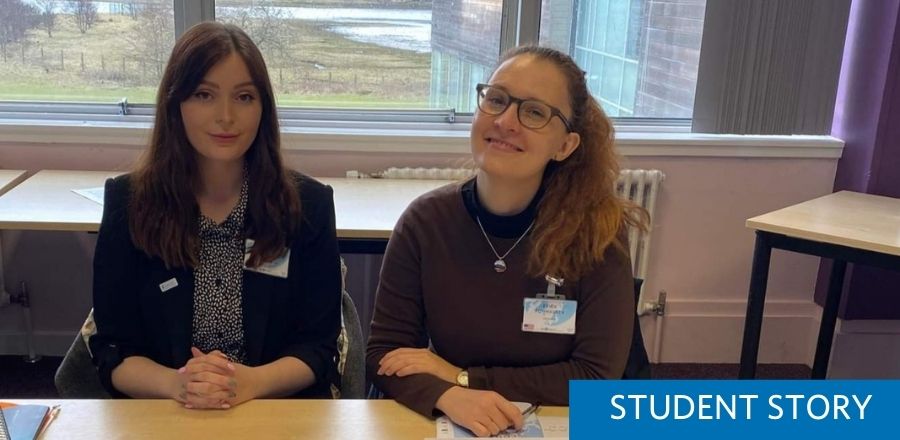GCU students get unique opportunity to represent at Scotland Model Arctic Council

GCU students were amongst the chosen few to attend a unique diplomatic simulation, known as the Scotland Model Arctic Council (SCOTMAC).
SCOTMAC, which is designed for Undergraduate students, invites participants to play the role of representatives from one of the eight Arctic States or Arctic Indigenous peoples’ organisations. Hosted in the Scottish Association of Marine Science in Oban, the conference invited 16 students from universities across Scotland to take part.
Environmental Management students Erika Tonhauser and Jessica Greig were selected to represent GCU at the Artic conference, and both agreed that they gained a lot from the experience.
Erika, who already had an interest in polar nations, jumped at the chance to be involved in such a unique opportunity. She said: “My professional and academic interests lie mainly in the Northern worlds, so I was immediately intrigued by the Arctic council concept.
I was also very excited when we got our discussion topics as I frequently consider Indigenous communities and their role within the modern world in my research - I am always keen to learn more! We got to do deep research into Arctic states and everyone wrote a discussion paper which I very much enjoyed.
I was keen on being a part of debating as I have never done that before. All in all - SCOTMAC was simply a perfect opportunity for me to get involved in.
Jessica had never heard of the conference before, and decided to apply when her programme lead shared the opportunity. Her role on the day involved being part of a group that would create clauses for a policy document that ensured the protection of indigenous knowledge. She explained: “The Arctic Council is split between permanent participants and Arctic States (i.e., USA, Canada, Denmark, Sweden, Finland etc) and the permanent participants (i.e., Arctic Athabaskan Council, Saami Council, AIA, Inuit circumpolar council etc).
My role was as head of the delegation for the Arctic Athabaskan Council – one of the indigenous communities in the Arctic.”
She added: “Both working groups then came together and discussed both topics together and worked towards a combined document containing perambulatory and operative clauses for the two topics which resulted in the “Oban declaration” being created.
It is, of course, all pretend, but nonetheless very interesting to see how diplomacy works in it a simulated real-world environment. The honorary chair was Marie Anne Coninsx, who was the first EU Ambassador for the Arctic Council, so it was great to have her guidance throughout the 3 days.”
Erika, who’s role involved representing the US, felt very fortunate to have been selected for the experience. She said: “I feel very honoured; I was celebrating a little when I learned I got a place. SCOTMAC is an incredible networking and knowledge sharing opportunity which I gained a lot from.
Meeting students from Scottish, Irish as well as Oxford and Cambridge universities who are studying a wide range of subjects from politics to marine science and many other, and debating with them on such important issues was a fantastic learning curve for me. SCOTMAC was probably one of the best things I got involved in through my degree so far.”
Being involved in the experience allowed Jessica to challenge her perceptions of Artic regions, and has developed a greater understanding of the communities that live there. She said: “It was great to be involved and I learned so much about the Arctic. It was pointed out at the beginning that most people regard the Arctic as a sort of barren wasteland with starving polar bears without understanding there are many indigenous communities that live there and call it home.
I have to say I was guilty of just thinking of the polar bears prior to taking part in this event, and now I have such a deeper understanding of the Arctic, the people that inhabit it, and the challenges it faces from climate change.”
Reflecting back on the experience, Erika would highly recommend for other students to apply in future. She said: “Go for it a 100%! It is an extremely unique experience unlike anything else.
This year's SCOTMAC was the first ever model Arctic council that happened specifically in Scotland, and now that the pilot is done (and ended up being so successful as we managed to adopt the 'Oban Declaration’) it can only really get better, right? You will love it, and this applies even if you're not the strongest public speaker/debater like myself!”
Find out more about SCOTMAC on their website
By Rachael McAlonan
Got a SCEBE or GSBS story? Email me at Rachael.McAlonan@gcu.ac.uk or connect with me on social media here
